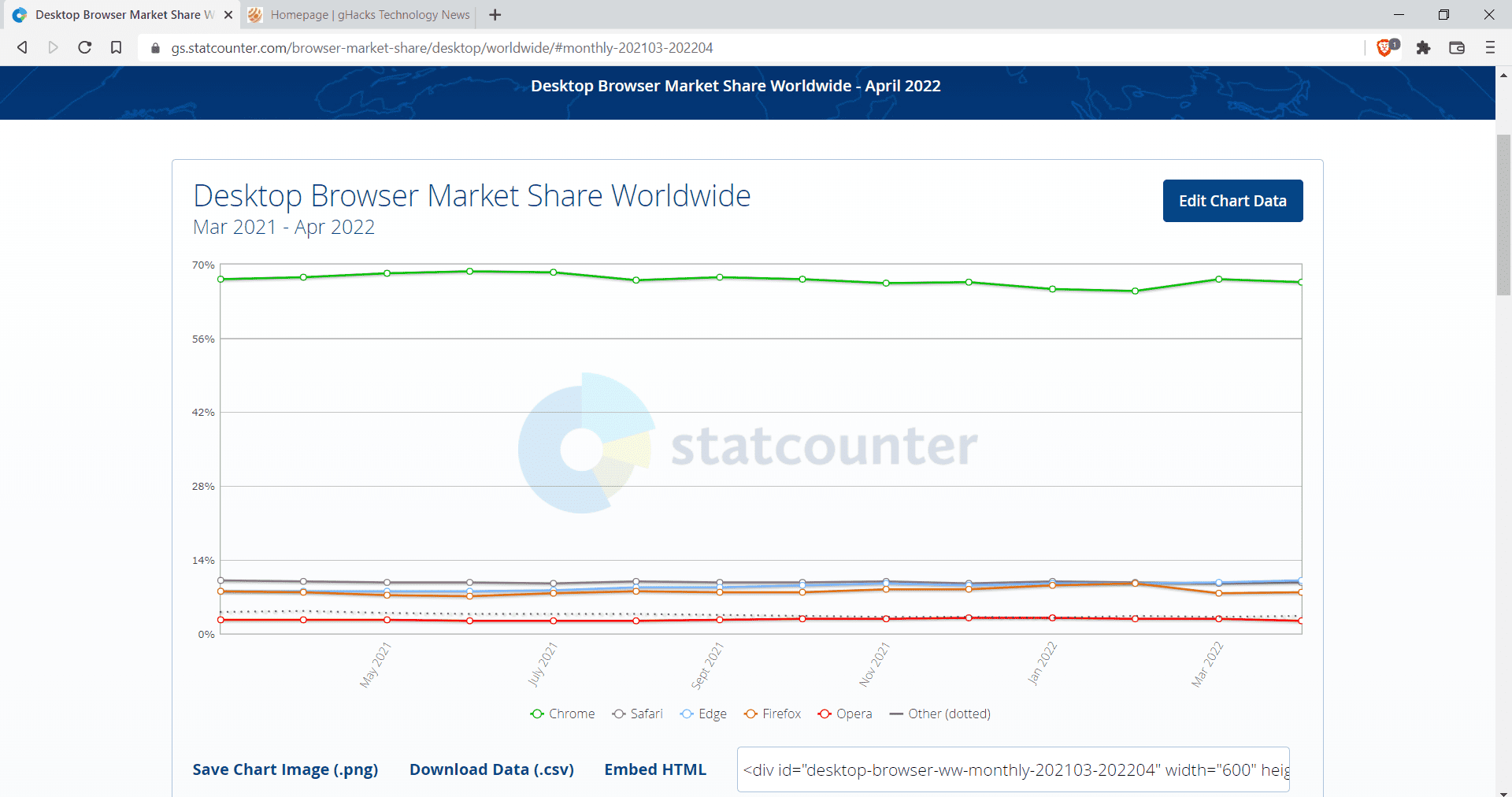Microsoft Edge beats Safari and Firefox to become second after Chrome on desktop systems

Microsoft's Chromium-based Microsoft Edge web browser surpassed the 10% usage share market on desktop systems in April 2022 according to Statcounter; this means that it is second only to Google Chrome, which still dominates usage share statistics.

Statcounter's global browser market share saw Edge break the 10% mark for the first time since its introduction. Microsoft's browser has a usage share of 10.07% of the desktop browser market worldwide according to Statcounter's statistics.
Google Chrome is leading the pack with a share of 66.64%. The browsers that follow in third, fourth, fifth and sixth place are Safari, with 9.61%, Firefox with 7.86%, Opera, with 2.43% and Internet Explorer, with 0.97% of the desktop browser share.
Edge's desktop share rose from 8.03% a year ago on desktop systems to 10.07%. Usage shares did not change much the other browsers in the top 5. Safari lost half a percentage, Firefox remained steady but it appears that it lost some of the gains that it made throughout the last year. Browsers in the other category saw a reduction of usage, but Statcounter does not reveal how much.
One explanation for Microsoft Edge's usage share rise on desktop systems is that it is the default Windows 11 web browser. Microsoft is pushing Edge on desktop systems and the retiring of Internet Explorer 11 next month may give Edge another slight push.
While Edge is doing well on desktop systems, it is not doing as well on mobile devices.Statcounter does not have Edge listed as a browser in its top sixth. Google Chrome is leading with 62.87% of the usage share, thanks to the company's dominant grip on the Android ecosystem. Safari is at 25.35%, Samsung Internet at 4.7%, Opera on 1.83%, and UC Browser at 1.36% of the mobile browser usage share.
Microsoft's dilemma is the lack of a mobile operating system. Google and Apple have cornered the market, and only some browsers, that are not created by the two big players, managed to gain a sizeable share of the market.
A look at combined statistics for desktop and mobile usage sees Chrome leading the field once again with a usage share of 64.36%. Apple's Safari browser follows with 19.13%, and Microsoft Edge is placed third with 4.07% of the entire market. Firefox, Samsung Internet and Opera with 3.41%, 2.84% and 2.07% respectively are placed fourth, fifth and sixth.
Closing Words
Chrome is fairly stable at the top, which may be surprising to some, as browsers such as Vivaldi, Brave, Firefox and even Edge have more to offer. It seems unlikely that Microsoft Edge, or any other desktop browser, is going to surpass Google Chrome anytime soon.
Now You: what is your favorite browser right now?

















Brave. It uses a modified Chromium (no Google links), blocks ads and tracking. It also has a built-in password manager, which I find super useful.
What’s a surprise preinstalled web browser in the most popular desktop operating system beats not preinstalled one. Really, really big success.
Microsoft took chromium (really good web engine), dropped not so bad their and some time announced “we have we browser, people use it – this is the best web browser for you”.
On desktop : Firefox.
On mobile : Opera
The same choice. Good choice.
There are times when being tracked is benificial. Edge works well for this.
The rest of the time it’s not really the invasion of my privacy that upsets me. It’s that others profit greatly from what is mine and I don’t get any of it.
“[W]hat is your favorite browser right now?”
Despite the fact that a large number of sites now code for Google Chrome exclusively, a larger number for chromium-based browsers exclusively, and an even larger number for multi-process browsers exclusively, my favorite is still Pale Moon, for all the reasons that made *legacy* Firefox the number-one browser back in the day (to wit: out-of-the-box privacy; powerful and genuinely useful extensions; broad configurability/customizability; and really extensive user-control). And since an increasing number of sites no longer run well (or at all) in Pale Moon, chromium-based Brave is my fallback browser (because it supports almost all sites and does a better job of protecting privacy out of the box than most of the alternatives).
I only use K-Meleon. It’s the best browser.
I haven’t imported all of my bookmarks and what not to use Edge on a daily basis; still using that product named Firefox. It’s fine, but Edge has some superfast response in clicks and page rendering that is entirely absent from Chrome or Firefox. Nice front page as well.
One is defaulted on Windows install, the other one is constantly nagging people on Google with disgusting misinformation. It’s only obvious they’d both be at the top. Most people don’t give a shit about privacy, extra features or customization, they just want what is readily available.
And again:
https://fingerprintjs.com/demo/
https://ibb.co/gzJ11rr
https://ibb.co/vQ5rky5
When I click on that first link in Firefox with the arkenfox user.js, I get a different hash each and every time…….
I must be doing something right!
Edge and Chrome are not bad if you act on the settings and equip them with extensions that protect your privacy
https://ibb.co/wJ3BD75
@Sampei Nihira
There is no privacy on Chrome or Edge (or Opera, for that matter). The browsers themselves are collecting data on you, how does some extension like uBlock Origin which only deals with tracking scripts (but not in-browser telemetry) make that much of a difference then? You need to start on solid ground and then go from there, Edge and Chrome are not solid by a long shot.
You can potentially fool the fingerprinting test via various extensions that “randomizes” certain output (like Canvas, or WebGL), but the extension’s behavior is in itself unique to the extension (non-native) and thus fingerprintable. The user base of these extensions is also very small, thus putting you in a very small pool of users (bad).
The only Chromium-based browsers that defend against fingerprinting are Brave and Bromite.
If you think that Brave is the only browser that defends the privacy then read the info about JShelter that uses the same countermeasures adopted by Brave
Try testing at a website they displays some results.
This one, for example
https://coveryourtracks.eff.org/
Read the detailed summary.
Despite my laptop being far from unique, My result says “Our tests indicate that you have strong protection against Web tracking…Your browser fingerprint has been randomized among the 220,239 tested in the past 45 days. Although sophisticated adversaries may still able to track you to some extent, randomization provides a very strong protection against tracking companies trying to fingerprint your browser.”
I don’t use a fingerprint extensions.
This site will give details of the information that can be gleaned from your system in the ‘What websites see about you’ section
https://gologin.com/check-browser
It will get a fingerprint from you no matter what you do. The question is how many others have the same fingerprint. The more extensions you add to try to gain privacy (including fingerprint blockers) the fewer computers there are with the same fingerprint and the more likely is they’ll come up with a unique fingerprint.
We know it’s not secure; only a couple of those in service, and there’s no “ibb” in the address.
What extension are you using for this?
Jshelter
___________________
Edge – Tracking Prevention – Strict
UBO – Hard Mode – with customized privacy lists
Miracle Man, named because of his ability to make the blind see, the deaf hear, the sick recover health, stopped by a fellow lost in tears.
– Why do you cry?
– Because I lost my laptop. Could you help me, Miracle Man?
– Depends. What browsers do you use?
– Chrome and Edge
Miracle Man went his way, silently crying himself as well.
Only because edge built embeded in their latest versions with vpn cloudflare.
Like 1GB a month is going to entice someone to use a browser. If so, why not Opera with unlimited access, no logging, choice of servers, etc.
Silly boys!
Stats on VPN usage would probably disprove that.
If you use VPN, are analysis tools able to determine your browser, extensions, operating system, VPN carrier, etc? If so, what is the advantage of VPN when you are still easily canvas printed?
Chrome is some kind of monopoly due it’s in every Android phone, and people is used to it, so probably some installations are due for the smartphones. Thanks for the article! :]
This is about the desktop marketshare. Where people have to install Chrome, it’s not preinstalled in any desktop OS, except chromeOS. I think the reason people bother to install chrome in windows has nothing to do with android. It has to do more with bing vs google search. No matter what some people think, people really like google search. When they try the preinstalled Edge and see in front of them Bing…. they immediately try to fix it. And the easiest way is to install chrome than trying to fight microsoft defaults…
But Apple doesn’t make Safari for Windows anymore, just on MacOS only
My favourite browser is Firefox with the arkenfox user.js, of course!
arkenfox let mozilla syphon away your dns data to usa corps for over a year.. deliberately :(
??? how so ?
The biggest spyware is at the top.
But!
If you say people are dumb, that’s offensive and you’re a bigot!
When it is bundled with Windows and can’t be uninstalled it isn’t surprising.
Chrome is not bundled with Windows, and Edge can be uninstalled.